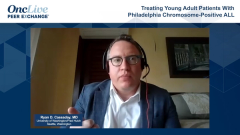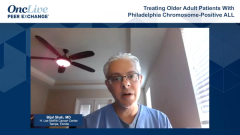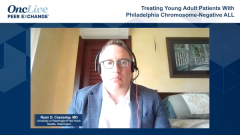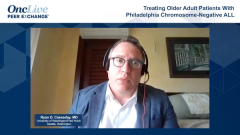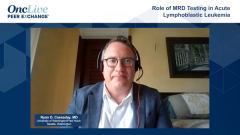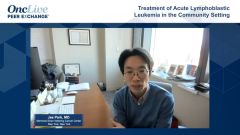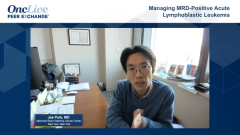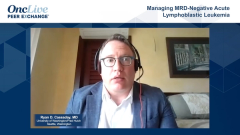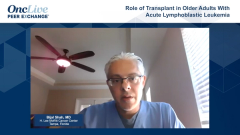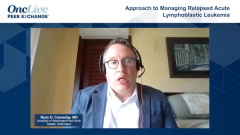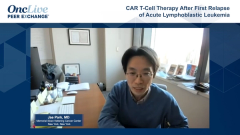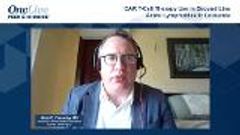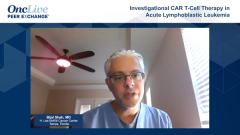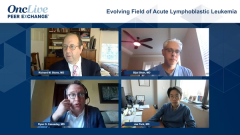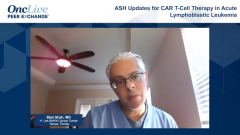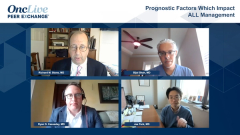
ASH Updates for CAR T-Cell Therapy in Acute Lymphoblastic Leukemia
Episodes in this series

Richard M. Stone, MD: What are the other investigational CAR [chimeric antigen receptor] T-cell therapies, not necessarily their names, but their mechanisms that are going to be different?
Jae Park, MD: The one the farthest along or that is beginning to be entering clinical studies is off the shelf, which may make a difference. These are already being investigated and being studied in multiple myeloma and diffuse large B-cell lymphoma. At ASH [the American Society of Hematology annual meeting], we also heard about UCART22, targeting a different antigen, but there is an allogeneic off-the-shelf product and there are many different types out there.
Regarding off the shelf, without naming one clinical trial, there are different technologies that can modify the T cells, and there are ones with NK [natural killer] cell-based therapies derived from healthy donors, or core blood, or iPSC [induced pluripotent stem cell]-derived, the NK cells and T cells. There is a variety of different immune effector cell therapies, targeting either CD19 or CD22 in the case of B-cell malignancies. The big benefit is the immediate availability of the product, so we do not have to wait for the bridging chemotherapy with the manufacturing, whether it is 3 or 6 weeks. This time is always getting shorter. The bigger question, is it going to deliver as durable an outcome as autologous, the CD19 CAR product? For that, it will take a longer time for the data to read out.
Richard M. Stone, MD: Do you think we have solved the immunogenicity problem with the off-the-shelf product? My view is that they are very short-lived, and we have not fixed that problem yet, even though that was the goal.
Ryan D. Cassaday, MD: Most of these studies are still early, so it is hard to say anything with any real confidence. The prospect of an off-the-shelf product is great in the idea that we can deliver it more quickly. But I have yet to see any data that convince me that the efficacy of these products is on par with the autologous ones.
Bijal Shah, MD: Within a year we will have brexucabtagene autoleucel. It will be interesting to see how Kite and the FDA negotiate, and what that approval looks like. Will it be for all relapses or will they specify after 2 prior lines? My hope is after that, we start to see something we have never seen, which is exploring CAR T-cell therapy with this Kite product, in the context of the alliance, really bringing it forward. We try to understand now as we approach this in a broader context and then figuring out who is that high-risk patient population. How do we design a trial, in the context of the alliance, to now prioritize the CAR for these very high-risk patient populations, and what are the questions that we want to answer by virtue of doing so? That is where I would like us to see in a year because we will have an approval.
The CD22 autologous CARs are not as durable, but there is some excitement. The reason I am excited about them is in trying to understand where we are going to land in not 1 year, but in 2 or 3 years. Are we going to be doing work like what Rebecca Gardner, MD, has done at the Fred Hutchinson Cancer Research Center, where we are combining a CD19 and a CD22 CAR to try and avoid some of these antigen escape issues? Are we really going to focus on bispecific monoclonal antibodies? What is that CD22 CAR going to look like, and what is it going to teach us in terms of the biology of ALL [acute lymphoblastic leukemia] ...?
One of the things I was impressed with at ASH was a discussion on CD58 and its impact on CAR T-cell responsiveness and the impact of failing to interact with CD2 on the CAR T cells. They are interesting data, and so much that we must learn still in this CAR T-cell space. As it relates to general allogeneic off-the-shelf CARs, they can be durable. Dr Park and I are part of one trial where we are using this now in patients with aggressive lymphoma and lymphoblastic leukemia. We are seeing some patients achieve deep and durable remissions. It is hard, and not everyone is going to experience that. We still have not put our finger on who is going to be the best responder, and so for now we are doing things like adapting the lymphodepletion to try to understand how we can contribute to the longevity universally and see better outcomes in that context. Allogeneic off-the-shelf CAR delivers at a lower cost point that promise of the patient just needs an MRD CR [minimal residual disease complete response] so they can get to transplant.
Transcript Edited for Clarity


